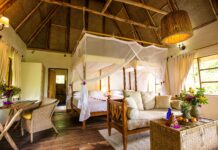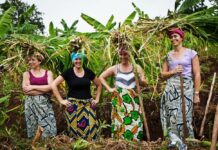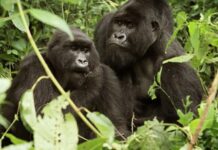Rwanda, quite rightly, is most famous for gorilla trekking adventures. It is an extraordinary experience, only possible in a few places on earth these days. Volcanoes National Park, in the North of the country and part of the Virunga Mountains on the border with the Congo and Uganda, is where the trekking takes place. Stunning vistas abound as you trek through jungle to find the Silver back Mountain gorillas.
There are several gorilla families and trackers head out early, before your gorilla trek begins, in order to locate them. Knowing where the gorillas are in advance allows the park rangers to assign appropriate gorilla families to the small groups who head out.
You can request a closer family if you feel you aren’t as fit as you maybe once were! It should be noted though, that any gorilla trek does require at least some stamina and good mobility.
Gorilla trekking is not the only activity on offer in Volcanoes National Park. Learn about the history of the gorillas and trek to the grave of Diane Fossey, a pioneer in the preservation of the area and the species, without whom gorillas may be even more endangered than they are today, if here at all. The Musanze Caves are also well worth a visit, a stunning geological formation you can spend an afternoon exploring.
Join the annual Kwita Izina gorilla-naming ceremony special time when you visit Volcanoes National Park. The annual naming ceremony takes place in Kinigi, but visitors can also join a several-day guided tour from Kigali running up to the main event, where they will get to meet the park staff and leading conservationists, attend cultural evenings and a celebration in Musanze, and after gorilla tour then visit to the little – visited Lakes Burera and Ruhondo, and finally attend the naming ceremony, where there’s music, dancing, and discussion on the great strides that Rwanda has made in gorilla conservation, and the great challenges that remain.
Visit local communities and experience Rwanda’s traditional way of life. The largest group in the country is the Tutsi, followed by the Hutu and Twa.
Expect to hear delightful and engaging folk tales, riddles, and proverbs when you interact with the Tutsi. While among the Hutu, you may witness a unique ceremony that takes place when a new baby is born in a village. The mother and newborn remain in their house alone for seven days.
A naming ceremony is held on the last day, during which the village children join the mother and child. The Twa are pygmy people, known for their pottery, semi-nomadic way of life, and hunter-gatherer lifestyle.
They offer input on the traditions and beliefs they wish to share with the world via these tours, as well as on areas of life they prefer to share only amongst themselves. You will be amazed and touched by the commitment of Rwandans to maintaining their ancestral way of life while living in a modern world.
These tours benefit the villages, including Iby’Iwacu and Banda, as the activities provide employment often in lieu of poaching or other desperate ways of earning a living as well as funding for healthcare, education, and ultimately hope for the future.
Iby’Iwacu Village is conveniently located just outside the park in Kinigi, and offers you a chance to make new friends. Your immersion in tribal customs begins immediately upon arrival, with a joyful dance performed to the rhythm of African drums. Other members of the community welcome you with warm smiles and gentle words before guiding you into the village for a tour, which includes a twin of the traditional king’s house.
Sit on the throne for a moment and receive the king’s powers from a village elder. Meet a healer who will demonstrate traditional medicine and enlighten you about the grasses, shrubs, and trees that provide the herbal ingredients.
Assist villagers with meal preparation and perhaps enjoy a lunch or dinner of traditional dishes. You may also wish to visit a local school, a banana beer brewery, and the place where Batwa (Twa) pottery is made. If you have time for an extended visit to Iby’Iwacu Village.


